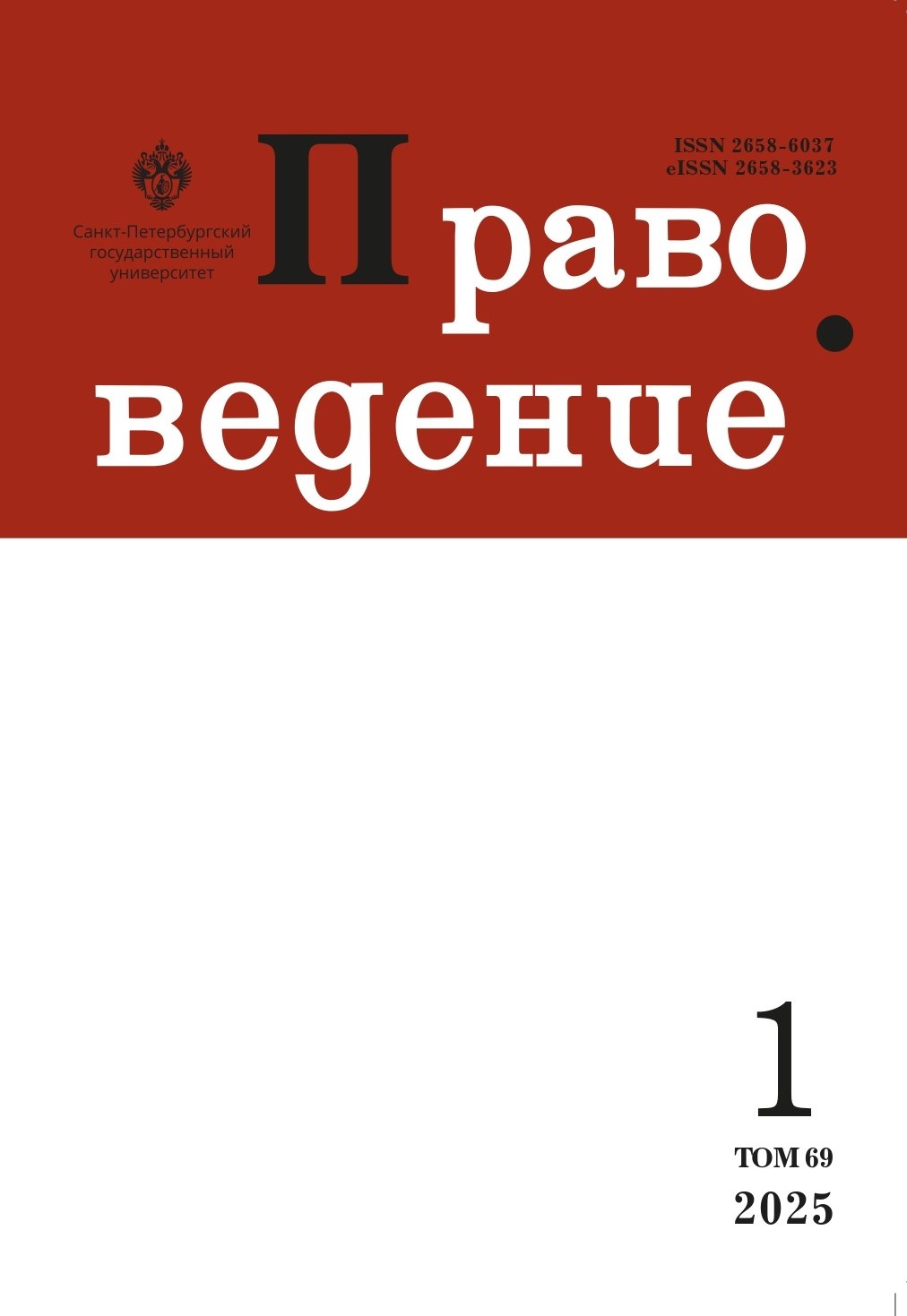Digital platforms in law and the law of digital platforms: New challenges for the legislator and ways to deal with them
DOI:
https://doi.org/10.21638/spbu25.2025.104Abstract
A comprehensive analysis of the impact of platformization of social relations and public administration on the law allows us to determine the place of the digital platform in the modern law architecture. At first glance, the platform solution is presented as a complex object of civil law, combining in a functional unity a variety of elements (computer programs, databases, works, as well as equipment, etc.), in relation to which public relations arise. However, platformization is reflected not only in the application of new technologies, but also in the implementation of a special model of conducting activities to provide access to information and digital services. On this basis, the role of the digital platform operator seems to be underrated. Using the comparative-legal method, methods of analysis and generalization, the authors refute the widespread view of platform operators as agents does not find its confirmation in the legislation, which allows digital platform operators to be attributed as commodity market infrastructure. The implementation of digital technologies at the level of platform solutions, including Big Data and artificial intelligence technologies, reveals the power of platforms, which, among other things, is manifested in the creation of their own rules for users’ access to various benefits. This refers to the opportunities that arise for the operator of digital platforms, given the control over the property complex of the platform and in connection with technological advances in allowing or blocking the admission of users to digital services. The role of individual regulation is significantly expanding, when the rules that have the property of normativity, are applicable to an indefinite number of persons and are intended for repeated use, and therefore impersonal and standardized, can be replaced by legal norms detailed for a specific situation, the regime of which is at the intersection between contractual and legal regulation. This allows us to determine that today in Russia the concept of platform law forms. The architecture of regulation of relations involving the use of platforms may consist of a system of components that form several levels of legal regulation: state regulation; a system of advisory regulation, soft law and legal customs; rules developed by the platform operator to regulate the use of the platform. The authors’ conclusions may be useful in the context of discussing the possibility of creating a Digital Code of the Russian Federation.
Keywords:
digital economy, digital platform, digital platform operator, platform law, Digital Code
Downloads
References
Abrosimova, Elena A. 2014. Organizers of trade turnover: Legal status and functional purpose. PhD in Law thesis. Moscow. (In Russian)
Afanasiev, Vladimir S. 2008. Legal formation and law-making. Iuridicheskaia nauka i pravookhranitel’naia praktika 1 (4): 4–14. (In Russian)
Andreeva, Lyubov V. 2023. Modern legal problems of trade infrastructure development. Zakony Rossii: opyt, analiz, praktika 4: 36–43. (In Russian)
Ben-Shahar, Omri, P. A. 2021. Personalized law: Different rules for different people. Oxford, Oxford University Press.
Busch, Christoph. 2019. Implementing Personalized Law: Personalized Disclosures in Consumer Law and Data Privacy Law. The University of Chicago Law Review 86: 309–333.
Gabov, Andrey V. 2022. Online dispute resolution of the participants of digital platforms (ecosystems). Vestnik grazhdanskogo protsessa 1: 208–235. (In Russian)
Gracheva, Svetlana A. 2014. Doctrine of the rule of law and judicial legal positions. Zhurnal rossiiskogo prava 4: 33–45. (In Russian)
Ibragimov, Lenar A. 2007. Infrastructure of the commodity market: Textbook for university students. Moscow, UNITY Publ. (In Russian)
Jashari, Mura. P. I. 2018. The role of the principle of transparency and accountability in Public Administration. Acta Universitatis Danubius. Administratio 10 (1): 60–69.
Kartskhia, Alexander A. 2019. Digital technological (online) platforms: Russian and foreign experience of regulation. Grazhdanskoe pravo 3: 25–28. (In Russian)
Kashkin, Sergey Yu., Chetverikov, Artem O., Altukhov Alexey V. 2022. Fundamentals of platform and ecosystem law. Moscow: Rusains Publ. (In Russian)
Kozlova, Natalia V. 2005. Pravosubjectivity of a legal entity. Moscow, Statut Publ. (In Russian)
Martynov, Alexey V., Bundin, Mikhail V. 2022. Platform law and its role in the regulation of digital technologies. Law and other regulators in the development of digital technologies. Minbaleev A. V. (ed.). Мoscow: 229–249. (In Russian)
Parker, Geoffrey, Marshall, van Alstyne, Choudary, Sangeet Paul. 2016. Platform Revolution: How Networked Markets Are Transforming the Economy and How to Make Them Work for You. New York, WW Norton & Company. Available at: https://ilp.mit.edu/sites/default/files/2020-01/Parker.2017.ICT2_.pdf (accessed: 30.01.2024).
Puginsky, Boris I., Belov, Vadim A., Abrosimova, Elena A. (eds). 2016. Commercial law: textbook for academic bachelor. Moscow. (In Russian)
Razumov, Egor A. 2019. Digital dictatorship: features of the social credit system in the People’s Republic of China. Trudy Instituta istorii, arkheologii i etnografii DVO RAN 24, 3: 86–97.
Robles-Carrillo, Margarita. 2022. Digital Platforms: A Challenge for States? The Platform Economy: Designing a Supranational Legal Framework. Singapore, Springer Nature Singapore: 49–62.
Sinaisky, Vasily I. 1917. Russian civil law. Iss. I: General part. Proprietary law. Copyright. Edition of the second, corrected and supplemented. Kiev, Tipografiia A. M. Ponomareva pri uchastii I. I. Vrublevskogo Publ.(In Russian)
Talapina, Elvira V. 2020. Human rights and digital sovereignty. Gosudarstvennaia vlast’ i mestnoe samoupravlenie 6: 10–15. (In Russian)
Zalnieriute, Monika, Moses, Lyria Bennett, Williams, George. 2019. The rule of law and automation of government decision-making. The Modern Law Review 82 (3): 425–455.
Downloads
Published
How to Cite
Issue
Section
License
Articles of "Pravovedenie" are open access distributed under the terms of the License Agreement with Saint Petersburg State University, which permits to the authors unrestricted distribution and self-archiving free of charge.




